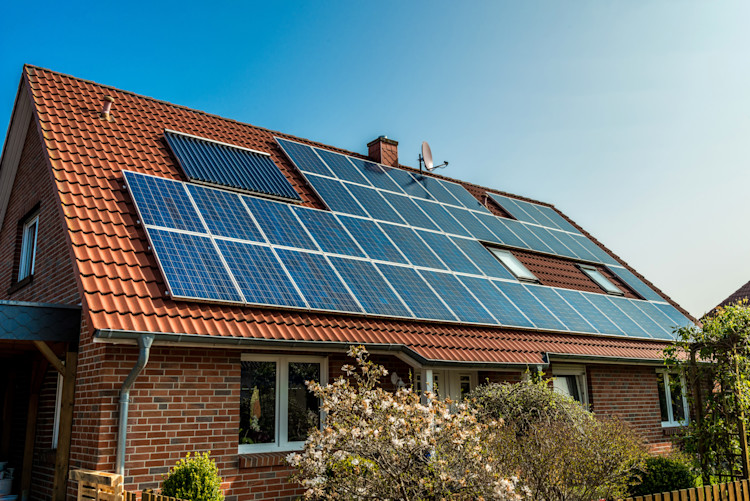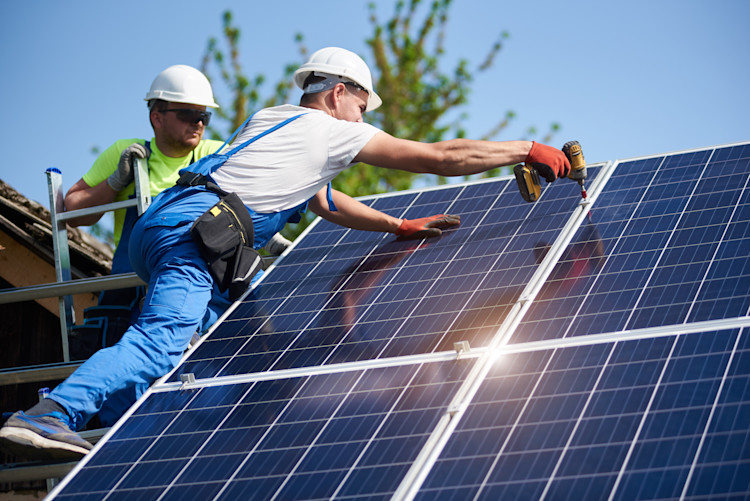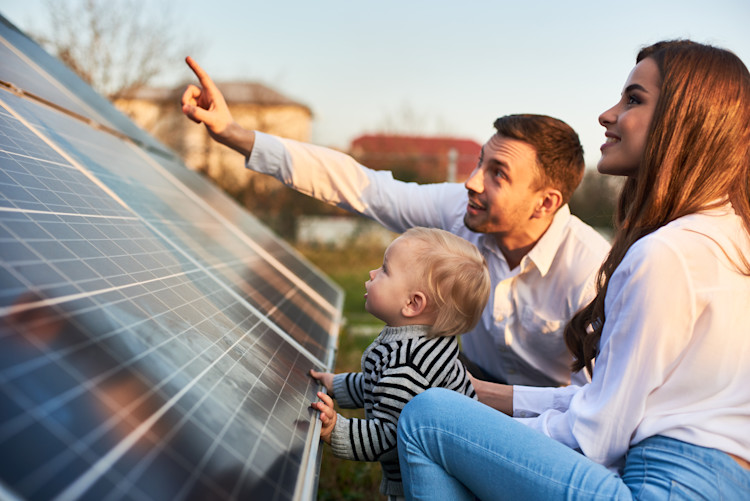Find a Solar Panel Installer near you
The average rating for Bark Solar Panel Installers is 4.83, based on 79,568 reviews
depending on the number of solar panels, your power output, and the expert you use to install them.
The average price of a solar panel installation is £7,000 depending on the number of solar panels, your power output, and the expert you use to install them.
Your price may be higher than this if you have complicated requirements. For example, a 6kWp PV system size could push you up towards £15,000 – especially if you install upwards of 20 solar panels.
Solar panel prices fell by 93% in a recent decade, according to the International Renewable Agency (IRENA). This shows that solar panels are becoming more popular. Companies are also speeding up at installing solar panels, since there’s now a wider workforce of skilled installers.
You should remember that your solar panel price will vary based on location, roof type, and the company you use. Prices tend to be higher in the south-east of England, compared to the rural areas of Wales or Yorkshire. Some roofs are ‘more compatible’ than others for solar panels too – more details about this further below.
Take a look at our table for guidance on the average solar panel prices. These numbers are based on our data and research, but the best way to get a personalised quote is from local solar panel installers.
| House size | Average cost | Number of 250W panels | Roof |
| 1-2 bedrooms | £4,000 | 8 | 16 metres² |
| 2-3 bedrooms | £6,750 | 12 | 26 metres² |
| 4-5 bedrooms | £10,000 | 16 | 32 metres² |

Your solar panel installation costs are affected by several factors. A few key examples include:
Roof suitability and size
Installation company
Your location
Solar PV system size
You should keep an eye on all of these to make sure the price doesn’t climb too high. If you’re unsure how these factors contribute to your price, here’s a summary about each one.
Needless to say, some solar panel installations are larger than others. If your usable roof size is 16 square metres, your average cost is around £4,000. But with a usable roof size of 32 square metres, you can expect to pay approximately £10,000.
Some roofs are also more ‘compatible’ than others. You can’t install solar panels on thatch roofs, glass roofs, or roofs containing asbestos. But you’re absolutely fine with all other materials.
Believe it or not, your roof slope can affect how quickly you make money back on your solar panels. The ideal angle is between 30-40°, whereas roofs with more unique slants may involve higher installation prices, along with reduced returns.
Every company has a unique method of pricing. Some businesses charge around £150 per month for solar panels (here’s an example) on a several-year plan that allows you to pay it back over time. This might come with some interest. Other companies charge up-front, with the price varying based on the number of bedrooms in your house. Speak to several installers to find out how they price their services.
Your location affects how much you can expect to pay. Across the UK, some regions are more expensive than others. For example, the Office for National Statistics indicates that the most costly areas are:
London – prices 7.2% above national average
South-west – prices 2.4% above national average
South-east – prices 1.5% above national average
Scotland – prices 0.4% above national average
Meanwhile, the least expensive areas are as follows:
Northern Ireland – prices 2.4% below national average
Yorkshire and the Humber – prices 2.3% below national average
Wales – prices 1.9% below national average
West Midlands – prices 1.5% below national average
You should adjust your price expectations accordingly based on where you live. A higher cost of living usually translates to a higher solar panel installation price.
Your house and family size will impact which Solar PV capacity you need. The options range from 1kWp to 6kWp.
The easiest way to figure out what suits your home is to add 1kWp for every person that lives there. So, 1kWp is usually enough to offset the energy demands for a 1 person home, and 4kWp would be enough for a family of 4.
The higher up the scale you go, the more panels are needed. However, higher capacity solar panels will also reduce your carbon footprint, especially for homes that use up lots of energy.
You’ll sometimes see 6kWp chosen for very large properties. This is especially useful if you plan to sell off excess energy to the grid.
| Region | Price difference from national average |
| London | +7.2% |
| South-west | +2.4% |
| South-east | +1.5% |
| Scotland | +0.4% |
| West Midlands | -1.5% |
| Wales | -1.9% |
| Yorkshire and the Humber | -2.3% |
| Northern Ireland | -2.4% |
Most experts suggest that it takes around 15 years for you to recoup your solar panel costs. You may want to calculate your expected bill savings before getting the solar panels installed. This helps you to set clear expectations on how much difference it’ll make.
You can also recoup solar panel costs by selling excess electricity to the grid. The ‘Smart Export Guarantee’ scheme has a set rate for each kilowatt hour (kWh) of electricity you generate from solar panels, but don’t use yourself. This could earn you anywhere up to £320 per year.
You can recoup your solar panel costs in other ways, too. Experts suggest that there’s a 1.7% price difference between a house rated A or B on their EPC certificate, compared to a property with a D rating. For a house valued at £400,000, this equals a £6,800 boost when you decide to sell. Solar panels help you to do this.

Installing your solar panels is one thing – but what happens if issues come up further down the line? Solar panel maintenance costs between £100 to £200 per year on average. It depends on the supplier you use and whether any issues exist.
Some more ‘significant’ repairs often bring the cost higher. Replacing an inverter is common with solar panels, and you can expect to pay around £750 to fix this problem. This might delay the time it takes you to get a return on investment. It’s thus extra important that you hire a reliable installer the first-time round.
Inverters tend to need replacing once every ten years. This is more frequent than the solar panels themselves, which have a lifespan of around 25 years. These figures should be factored into your calculations. But otherwise, yearly maintenance shouldn’t cost more than a couple of hundred pounds.
It’s completely natural if you feel a bit overwhelmed about the solar panel installation costs. Fortunately, there are ways you can cut down the up-front fee.
It’s no secret that the UK government is keen for its residents to ‘go green’. This means that several initiatives exist to help you financially with installing solar panels. At the time of writing, three main examples in the UK are:
Home Upgrade Grant (HUG)
Energy Company Obligation 4 (ECO4)
Social Housing Decarbonisation Fund (SHDF)
The Home Upgrade Grant gives funding for energy efficiency upgrades to low income households with a poor EPC rating. The Energy Company Obligation (ECO) does almost exactly the same thing. And the Social Housing Decarbonisation Fund upgrades social houses that are currently way below a ‘C’ score on their Energy Performance Certificate.
A second way to keep costs down is to do careful research on the installation company you use. Get in touch with several businesses for an independent quotation. You can then compare prices, and consider the trade-off between cost and quality. Some private installers allow you to pay back the costs over several years. Although this might come with some interest, it’s useful if you don’t have all the funds needed up-front.
You’ve got plenty of factors to consider when deciding whether to install solar panels. That’s why it can be extremely useful to separate it into ‘pros and cons’.
To start with, solar panels are more affordable now than in previous decades. Up-front installation costs have decreased and the government continues to offer grant schemes to thousands of homeowners.
You’ll also be able to operate independently of the grid. This is extremely useful in an emergency, such as the grid going down.
You’ll reduce your carbon footprint. Some people consider this essential for ‘clearing their conscience’ in relation to ongoing climate dilemmas. And your Energy Performance Certificate rating will increase. With the government forcing homeowners to have a ‘C’ score to rent out their house from 2028 onwards, this boost in rating might allow you to let out your property, when you otherwise wouldn’t have been able to.
Lastly, solar panels almost always increase your property value.
There are drawbacks to consider too. Lots of people think that solar panels are ‘unsightly’. You can’t always guarantee that it’ll suit the décor of your property. And if one of them gets damaged, it might become even more of an eyesore.
There’s a large up-front cost involved with solar panel installation. With the average price being £7,000, you’ll need to save up for a while to have this amount of disposable cash. It also takes 15 years (on average) to make your money back. It’s thus most suitable if you plan to live in the house for a long time.
There’s varying debate about how eco-friendly solar panels truly are. After all, when you consider the manufacturing, transport and installation of the panels, this can sometimes cancel out much of the positive environmental effect that it has.
Installing solar panels can also be challenging if you have a tenanted property. Navigating around the schedules of your tenants is not always straightforward.
| Pros | Cons |
| More affordable than previous years | Unsightly |
| Be independent from the grid | Large up-front cost |
| Eco-friendly | Questions over eco-friendliness |
| Increase house value | Difficult for tenanted properties |

It’s natural to feel a bit unsure about the up-front cost involved with solar panels. But it can be an outstanding long-term investment for your property. 84% of people with solar panels have reduced their energy bills, according to a recent study.
Your house value will increase, which puts more money in your pocket when you sell. So if you have the funds available to make it work – or you qualify for a government grant scheme – it’s certainly worth considering.
On the other hand, if you’re struggling financially in the short-term, then solar panels may not be a top priority. There are dozens of other things that you could use this money for. Speaking to a financial adviser can give you a better perspective on all your choices.
Yes. According to Nationwide there’s an approximately 1.7% price difference between a house rated A or B on their EPC certificate, compared to a property with a D rating. For a house valued at £500,000, this equals a £8,500 boost in value.
Your buyers will have lower energy bills, which makes your house more valuable. Lots of people in the modern-day are also very concerned with their carbon footprint. Your house will thus be more attractive to these individuals.
Yes, this might be possible. You can get in touch with private companies to give you a loan for solar panel installation, which you must pay back further down the line.
In theory, the eco-friendly changes that you make to your property should save on your energy costs, which is supposed to help cover the costs of the loan. Once the loan is paid in full, it’ll be removed from your bill. You can then enjoy the savings that the energy efficiency may have brought.
You’ll need to pay between £100 to £200 for an assessment that decides if your house is eligible. The loan will then cover the cost of the installation – and the private investor will indicate how you can make monthly repayments, with interest.
Speak to an expert for more guidance on this process and the steps involved.
Solar panels are made from photovoltaic cells, which absorb light from the sun and turn it into electricity. They are placed on your roof, which gives the panels the best chance of the sunlight hitting them.
Conducting wires carry the electrical current into the building. When it’s light outside and your electrical appliances are turned on, your solar panels can generate electricity to power them. The panels will still work in cloudy conditions, so long as they are exposed to daylight.
Any excess electricity will be exported to the national grid which may make you eligible for a financial return from your supplier. If you use your appliances when it’s dark outside, then your electricity will run from the grid instead.
Most of the time, no. It usually falls within the category of ‘permitted development rights’. But there are a few unique instances when you need to speak to the council. Speak to a legal expert for more guidance on property law.
The average rating for Bark Solar Panel Installers is 4.83, based on 79,568 reviews